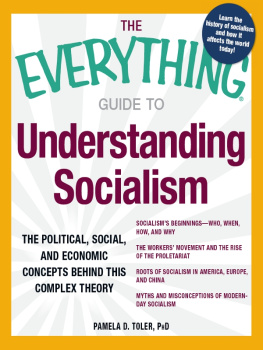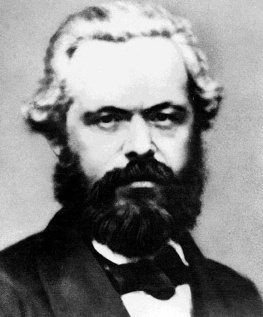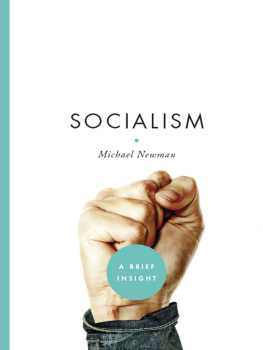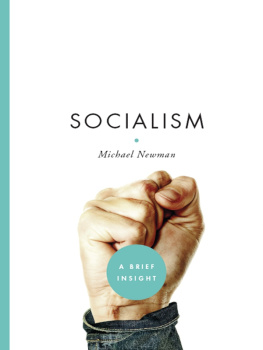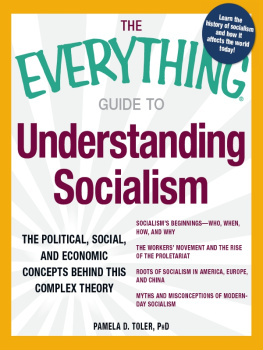THE
EVERYTHING
GUIDE TO
UNDERSTANDING SOCIALISM
Dear Reader,
I became interested in socialism by way of the British Empire. Indian cottons led me to the dark Satanic mills of northern England and the Industrial Revolution. The Industrial Revolution introduced me to Friedrich Engelss classic study of the lives of the working poor in England. Engels led me straight to Karl Marx. When I expanded my interests to European imperialism in general, French Algeria led me to the Paris Commune of 1830, which led me back to Karl Marx.
I soon discovered that if you spent much time reading about nineteenth-century Britain and Europe, you stumbled across socialism everywhere. Self-educated cobblers, radical dissenters, anarchist assassins, and methodical economists shared the pages with prime ministers and princes. The more I read, the more convinced I became that in the nineteenth century, socialism played the same role that yeast plays in bread dough: It made things ferment and change into something new.
Whatever your political beliefs, learning about socialisms history and beliefs is a good way to understand the present a little more clearly.

Welcome to the EVERYTHING Series!
These handy, accessible books give you all you need to tackle a difficult project, gain a new hobby, comprehend a fascinating topic, prepare for an exam, or even brush up on something you learned back in school but have since forgotten.
You can choose to read an Everything book from cover to cover or just pick out the information you want from our four useful boxes: e-questions, e-facts, e-alerts, and e-ssentials. We give you everything you need to know on the subject, but throw in a lot of fun stuff along the way, too.
We now have more than 400 Everything books in print, spanning such wide-ranging categories as weddings, pregnancy, cooking, music instruction, foreign language, crafts, pets, New Age, and so much more. When youre done reading them all, you can finally say you know Everything!

Answers to common questions

Important snippets of information

Urgent warnings

Quick handy tips
PUBLISHER Karen Cooper
DIRECTOR OF ACQUISITIONS AND INNOVATION Paula Munier
MANAGING EDITOR,EVERYTHINGSERIES LISA LAING
COPY CHIEF Casey Ebert
ASSISTANT PRODUCTION EDITOR Jacob Erickson
ACQUISITIONS EDITOR Kate Powers
ASSOCIATE DEVELOPMENT EDITOR Hillary Thompson
EDITORIAL ASSISTANT Ross Weisman
EVERYTHINGSERIES COVER DESIGNER Erin Alexander
LAYOUT DESIGNERS Colleen Cunningham, Elisabeth Lariviere, Ashley Vierra, Denise Wallace
Visit the entire Everything series at www.everything.com
THE
EVERYTHING
GUIDE TO
UNDERSTANDING
SOCIALISM
The political, social, and economic concepts behind this complex theory
Pamela D. Toler, PhD

To my husband, Sandy Wilson, who readchapters, demanded explanations, draggedme away from my desk, and cheered me on.
Copyright 2011 by F+W Media, Inc. All rights reserved.
This book, or parts thereof, may not be reproduced in any form without permission from the publisher; exceptions are made for brief excerpts used in published reviews.
An Everything Series Book.
Everything and everything.com are registered trademarks of F+W Media, Inc.
Published by Adams Media, a division of F+W Media, Inc.
57 Littlefield Street, Avon, MA 02322 U.S.A.
www.adamsmedia.com
ISBN 10: 1-4405-1277-9
ISBN 13: 978-1-4405-1277-3
eISBN 10: 1-4405-2549-8
eISBN 13: 978-1-4405-2549-0
Printed in the United States of America.
10 9 8 7 6 5 4 3 2 1
Library of Congress Cataloging-in-Publication Data
Toler, Pamela D.
The everything guide to understanding socialism / Pamela D. Toler.
p. cm.
Includes bibliographical references.
ISBN 978-1-4405-1277-3 (alk. paper)
1. SocialismHistory. 2. CommunismHistory. I. Title.
HX36.T63 2011
335dc22
2011006242
This publication is designed to provide accurate and authoritative information with regard to the subject matter covered. It is sold with the understanding that the publisher is not engaged in rendering legal, accounting, or other professional advice. If legal advice or other expert assistance is required, the services of a competent professional person should be sought.
From a Declaration of Principles jointly adopted by a Committee of the
American Bar Association and a Committee of Publishers and Associations
Many of the designations used by manufacturers and sellers to distinguish their products are claimed as trademarks. Where those designations appear in this book and Adams Media was aware of a trademark claim, the designations have been printed with initial capital letters.
This book is available at quantity discounts for bulk purchases.
For information, please call 1-800-289-0963.
Contents
The Top 10 Socialist Thinkers
1. Eduard Bernstein (18501932) was the theoretician behind Marxist revisionism, which purports that it is possible to use reform to create a socialist society.
2. William Beveridge (18791963), known as The Peoples William, wrote the blueprint for the modern British welfare state.
3. Antonio Gramsci (18911937) created the concept of cultural hegemony, which says that a successful revolution must change a societys dominant ideas as well as its political structure.
4. Michael Harrington (19281989) was sometimes called the man who discovered poverty. His book The Other America was a major influence on Lyndon Johnsons Great Society and the New Left of the 1960s.
5. Vladimir Lenin (18701924) transformed Marxist ideology to reflect Russian political realities. His recognition that peasants were as oppressed as any urban proletariat and represented a potential revolutionary force was the basis for later revolutions in relatively unindustrialized countries.
6. Karl Marx (18181883) and Friedrich Engels (18201895) were the Tweedledum and Tweedledee of socialismyou dont find one without the other. Together they developed the socialist theories on which Marxism is based.
7. Pierre-Joseph Proudhon (18091865) was the first person to call himself an anarchist. He developed the theoretical foundation for anarchism and syndicalism.
8. David Ricardo (17721823) was not a socialist himself. His economic theories of rent, the labor theory of value, and the iron law of wages laid the foundation for Karl Marxs analysis of capitalism.
9. Jean-Jacques Rousseau (17121778) distinguished between natural and social inequality.
10. Sidney and Beatrice Webb (18591947 and 18581943), founders of the English Fabian Society, developed the idea of gradualism: the transformation of society from capitalism to socialism through gradual reforms.
Next page
